NOTHING FISHY ABOUT THIS PROGRAM
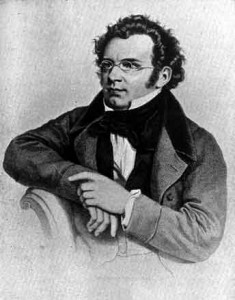 Former music critic and Chicago Symphony Orchestra program annotator Phillip Huscher wrote that Anselm Hüttenbrenner, one of Franz Schubert’s regular drinking partners, loved to tell the story of the night he invited the composer over to share some bottles of Szekszárd, a Hungarian red wine he had received as a gift. Hüttenbrenner said that they drained the wine to the last drop, and then Schubert sat down and composed the lovely song, “Die Forelle” (“The Trout”), from which his famous A-major piano quintet takes its name. Schubert even dated the manuscript “at 12 o’clock at night” to pinpoint the moment that yet another song poured forth as freely as wine. That was on Feb. 11, 1818. The truth is that Schubert had already composed “Die Forelle” early in 1817; he was merely writing it out from memory for his dear friend that night a year later under the beneficial influence of the blood-red Kadarka grape, and he was probably far too giddy to worry about fraud.
Former music critic and Chicago Symphony Orchestra program annotator Phillip Huscher wrote that Anselm Hüttenbrenner, one of Franz Schubert’s regular drinking partners, loved to tell the story of the night he invited the composer over to share some bottles of Szekszárd, a Hungarian red wine he had received as a gift. Hüttenbrenner said that they drained the wine to the last drop, and then Schubert sat down and composed the lovely song, “Die Forelle” (“The Trout”), from which his famous A-major piano quintet takes its name. Schubert even dated the manuscript “at 12 o’clock at night” to pinpoint the moment that yet another song poured forth as freely as wine. That was on Feb. 11, 1818. The truth is that Schubert had already composed “Die Forelle” early in 1817; he was merely writing it out from memory for his dear friend that night a year later under the beneficial influence of the blood-red Kadarka grape, and he was probably far too giddy to worry about fraud.
For many years, Schubert’s reputation rested on such anecdotes, which created an abiding image of him as a good sport who composed music quickly and without effort. Hüttenbrenner apparently was not even suspicious when Schubert appeared to compose “Die Forelle” off the top of his head, without once stopping to change a note, in handwriting as clean and legible as possible after several bottles of Szekszárd.
It has taken musicians some time to recognize that Schubert’s beguiling natural voice was the result of serious study, hard work, vision and the kind of inner struggle associated with his Viennese contemporary, Beethoven. Even Robert Schumann, who understood the true depth of Schubert’s genius better than anyone else at the time, once described him as a “guileless child romping among giants.” Both the song “Die Forelle,” which reveals Schubert’s most playful side, and the great piano quintet, which treats the Forelle theme to a magnificent set of variations, have only perpetuated this image over the decades, for these two have long been among Schubert’s most popular works. Among other Schubertian delights, you will hear both the song and the quintet at this Sunday’s Le Salon de Musiques.
Accompanied on piano by Artistic Director François Chouchan, baritone David Castillo will sing “Die Forelle” and several other lieder. The song, a setting of a commonplace poem by Christian Friedrich Daniel Schubart, is one of Schubert’s most felicitous creations, a delightful song in three stanzas with the third unexpectedly different from the first two. This was one of his best-loved songs  almost from the start, and it remains so today. Schubert was approximately 20 years old when he wrote it (the exact timing during 1817 can’t be determined because the first draft is lost).
almost from the start, and it remains so today. Schubert was approximately 20 years old when he wrote it (the exact timing during 1817 can’t be determined because the first draft is lost).
The song went on to even greater popularity once it became the anchor of a new piece of chamber music composed two years later. Schubert and his friend Johann Michael Vogl spent the summer of 1819 in the town of Steyr, nestled in the “inconceivably lovely” countryside some 90 miles west of Vienna. There they met Sylvester Paumgartner, a rich merchant and enthusiastic cellist with more money than talent. His large home included a well-stocked music library, a music room on the first floor, and a grand performing salon upstairs. He told Schubert that he loved Die Forelle and commissioned him to write a chamber work that incorporated a set of variations on the tune.
As a model, Paumgartner suggested a rather lifeless piano quintet in E-flat by Johann Nepomuk Hummel (taught by Mozart and admired by Chopin), which had a relatively undemanding cello part that Paumgartner was pleased to have mastered. He even dictated that Schubert write for the same five instruments as Hummel—piano (Chouchan at Le Salon), violin (Jessica Guideri), viola (Meredith 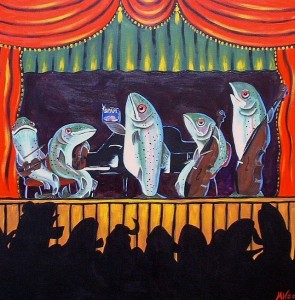 Crawford), cello (John Walz) and— instead of a second violin, which would later become the standard choice—a double bass (Timothy Eckert).
Crawford), cello (John Walz) and— instead of a second violin, which would later become the standard choice—a double bass (Timothy Eckert).
Like much of Schubert’s most enduring music, the Trout Quintet was not written for the concert hall, but for musicians who wanted something to play at home. “Die Forelle” is the basis for just a single movement of the quintet, yet the naturalness of its lyrical effusion and the pictorial quality of the accompanying figures—as well as the sheer joy it communicates about the very process of making music—has infected the entire composition. The Trout Quintet represents Schubert at his most natural, unaffected and carefree. In fact, this is truly music of Schubert’s innocence, before he contracted syphilis, probably late in 1822, and began to see life, and therefore music, in a darker and more complex light.
More musicological background will be imparted by Julius Reder Carlson prior to the program, which also includes Schubert’s Sonata “Arpeggione” for Cello & Piano in A minor, D. 821. Following French champagne and a Q&A with the artists is an high-tea-styled buffet supplied by Patina. While there will be smoked salmon sandwiches, I’m fairly certain trout is not on the menu.
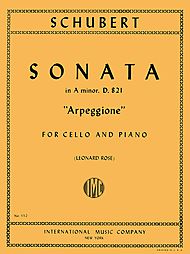 Le Salon de Musiques
Le Salon de Musiques
Season 5, Concert 5; All-Schubert Program
Sunday February 8, 2015, at 4:00
Dorothy Chandler Pavilion, 5th Floor
135 N. Grand Avenue
for tickets, call 310.498-0257 or call www.LeSalondeMusiques.com
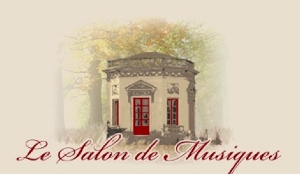
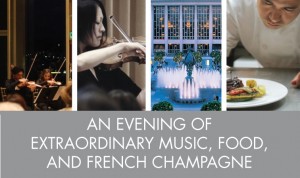
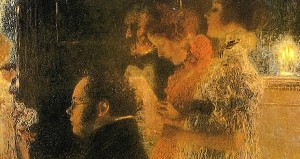


{ 2 comments… read them below or add one }
Outstanding article. Lucid and informative. Bravo.
The original poem consisted of four stanzas, the fourth being the “moral” of the story. Thankfully, Schubert left this stanza out:
Die ihr am goldnen Quelle
Der sichern Jugend weilt,
Denkt doch an die Forelle,
Seht ihr Gefahr, so eilt!
Meist fehlt ihr nur aus Mangel
Der Klugheit. Mädchen seht
Verführer mit der Angel!
Sonst blutet ihr zu spät.
You who tarry by the golden spring
Of secure youth,
Think still of the trout:
If you see danger, hurry by!
Most of you err only from lack
Of cleverness. Girls, see
Seducers with their tackle!
Or else, too late, you’ll bleed.
The Schubert scholar John Reed thought the poem to be “sentimental” and “feeble”, with the final stanza of the poem consisting of a “smug moral” that “pointedly advises young girls to be on their guard against young men with rods”.